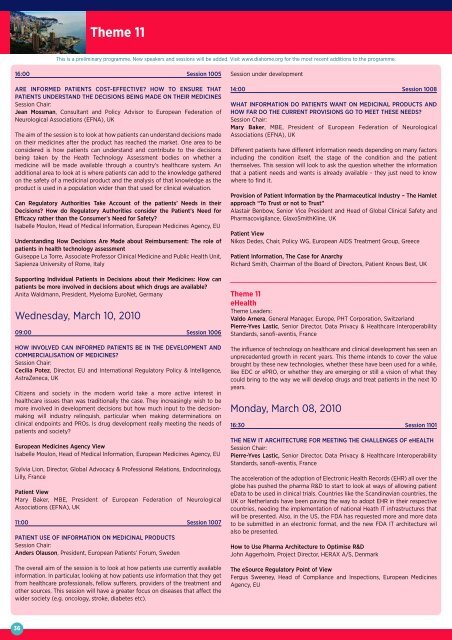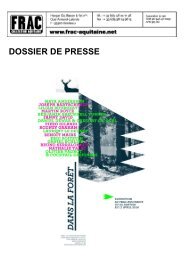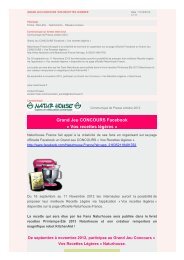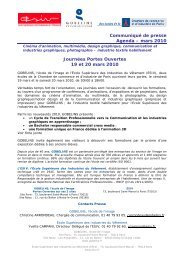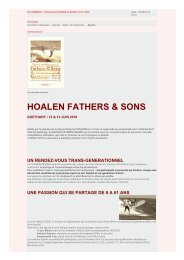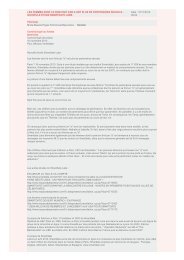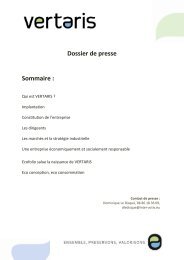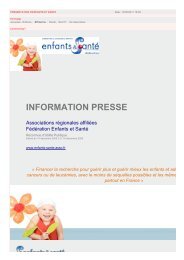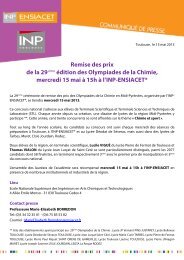Pre-Conference Tutorials, Monday, March 8, 2010, 09:00
Pre-Conference Tutorials, Monday, March 8, 2010, 09:00
Pre-Conference Tutorials, Monday, March 8, 2010, 09:00
Create successful ePaper yourself
Turn your PDF publications into a flip-book with our unique Google optimized e-Paper software.
36<br />
Theme 11<br />
This is a preliminary programme. New speakers and sessions will be added. Visit www.diahome.org for the most recent additions to the programme.<br />
16:<strong>00</strong> Session 1<strong>00</strong>5<br />
ARE INFORMED PATIENTS COST-EFFECTIVE? HOW TO ENSURE THAT<br />
PATIENTS UNDERSTAND THE DECISIONS BEING MADE ON THEIR MEDICINES<br />
Session Chair:<br />
Jean Mossman, Consultant and Policy Advisor to European Federation of<br />
Neurological Associations (EFNA), UK<br />
The aim of the session is to look at how patients can understand decisions made<br />
on their medicines after the product has reached the market. One area to be<br />
considered is how patients can understand and contribute to the decisions<br />
being taken by the Heath Technology Assessment bodies on whether a<br />
medicine will be made available through a country's healthcare system. An<br />
additional area to look at is where patients can add to the knowledge gathered<br />
on the safety of a medicinal product and the analysis of that knowledge as the<br />
product is used in a population wider than that used for clinical evaluation.<br />
Can Regulatory Authorities Take Account of the patients’ Needs in their<br />
Decisions? How do Regulatory Authorities consider the Patient’s Need for<br />
Efficacy rather than the Consumer’s Need for Safety?<br />
Isabelle Moulon, Head of Medical Information, European Medicines Agency, EU<br />
Understanding How Decisions Are Made about Reimbursement: The role of<br />
patients in health technology assessment<br />
Guiseppe La Torre, Associate Professor Clinical Medicine and Public Health Unit,<br />
Sapienza University of Rome, Italy<br />
Supporting Individual Patients in Decisions about their Medicines: How can<br />
patients be more involved in decisions about which drugs are available?<br />
Anita Waldmann, <strong>Pre</strong>sident, Myeloma EuroNet, Germany<br />
Wednesday, <strong>March</strong> 10, <strong>2010</strong><br />
<strong>09</strong>:<strong>00</strong> Session 1<strong>00</strong>6<br />
HOW INVOLVED CAN INFORMED PATIENTS BE IN THE DEVELOPMENT AND<br />
COMMERCIALISATION OF MEDICINES?<br />
Session Chair:<br />
Cecilia Potez, Director, EU and International Regulatory Policy & Intelligence,<br />
AstraZeneca, UK<br />
Citizens and society in the modern world take a more active interest in<br />
healthcare issues than was traditionally the case. They increasingly wish to be<br />
more involved in development decisions but how much input to the decisionmaking<br />
will industry relinquish, particular when making determinations on<br />
clinical endpoints and PROs. Is drug development really meeting the needs of<br />
patients and society?<br />
European Medicines Agency View<br />
Isabelle Moulon, Head of Medical Information, European Medicines Agency, EU<br />
Sylvia Lion, Director, Global Advocacy & Professional Relations, Endocrinology,<br />
Lilly, France<br />
Patient View<br />
Mary Baker, MBE, <strong>Pre</strong>sident of European Federation of Neurological<br />
Associations (EFNA), UK<br />
11:<strong>00</strong> Session 1<strong>00</strong>7<br />
PATIENT USE OF INFORMATION ON MEDICINAL PRODUCTS<br />
Session Chair:<br />
Anders Olauson, <strong>Pre</strong>sident, European Patients’ Forum, Sweden<br />
The overall aim of the session is to look at how patients use currently available<br />
information. In particular, looking at how patients use information that they get<br />
from healthcare professionals, fellow sufferers, providers of the treatment and<br />
other sources. This session will have a greater focus on diseases that affect the<br />
wider society (e.g. oncology, stroke, diabetes etc).<br />
Session under development<br />
14:<strong>00</strong> Session 1<strong>00</strong>8<br />
WHAT INFORMATION DO PATIENTS WANT ON MEDICINAL PRODUCTS AND<br />
HOW FAR DO THE CURRENT PROVISIONS GO TO MEET THESE NEEDS?<br />
Session Chair:<br />
Mary Baker, MBE, <strong>Pre</strong>sident of European Federation of Neurological<br />
Associations (EFNA), UK<br />
Different patients have different information needs depending on many factors<br />
including the condition itself, the stage of the condition and the patient<br />
themselves. This session will look to ask the question whether the information<br />
that a patient needs and wants is already available - they just need to know<br />
where to find it.<br />
Provision of Patient Information by the Pharmaceutical Industry – The Hamlet<br />
approach “To Trust or not to Trust”<br />
Alastair Benbow, Senior Vice <strong>Pre</strong>sident and Head of Global Clinical Safety and<br />
Pharmacovigilance, GlaxoSmithKline, UK<br />
Patient View<br />
Nikos Dedes, Chair, Policy WG, European AIDS Treatment Group, Greece<br />
Patient Information, The Case for Anarchy<br />
Richard Smith, Chairman of the Board of Directors, Patient Knows Best, UK<br />
Theme 11<br />
eHealth<br />
Theme Leaders:<br />
Valdo Arnera, General Manager, Europe, PHT Corporation, Switzerland<br />
Pierre-Yves Lastic, Senior Director, Data Privacy & Healthcare Interoperability<br />
Standards, sanofi-aventis, France<br />
The influence of technology on healthcare and clinical development has seen an<br />
unprecedented growth in recent years. This theme intends to cover the value<br />
brought by these new technologies, whether these have been used for a while,<br />
like EDC or ePRO, or whether they are emerging or still a vision of what they<br />
could bring to the way we will develop drugs and treat patients in the next 10<br />
years.<br />
<strong>Monday</strong>, <strong>March</strong> 08, <strong>2010</strong><br />
16:30 Session 1101<br />
THE NEW IT ARCHITECTURE FOR MEETING THE CHALLENGES OF eHEALTH<br />
Session Chair:<br />
Pierre-Yves Lastic, Senior Director, Data Privacy & Healthcare Interoperability<br />
Standards, sanofi-aventis, France<br />
The acceleration of the adoption of Electronic Health Records (EHR) all over the<br />
globe has pushed the pharma R&D to start to look at ways of allowing patient<br />
eData to be used in clinical trials. Countries like the Scandinavian countries, the<br />
UK or Netherlands have been paving the way to adopt EHR in their respective<br />
countries, needing the implementation of national Heath IT infrastructures that<br />
will be presented. Also, in the US, the FDA has requested more and more data<br />
to be submitted in an electronic format, and the new FDA IT architecture wil<br />
also be presented.<br />
How to Use Pharma Architecture to Optimise R&D<br />
John Aggerholm, Project Director, HERAX A/S, Denmark<br />
The eSource Regulatory Point of View<br />
Fergus Sweeney, Head of Compliance and Inspections, European Medicines<br />
Agency, EU


